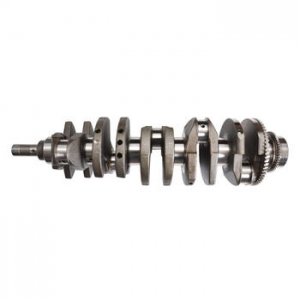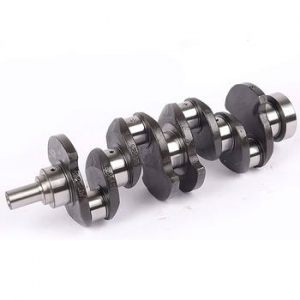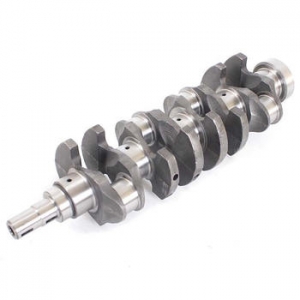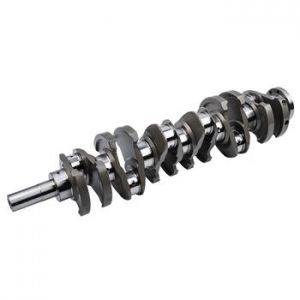Unlocking Power: Your Definitive Guide to Choosing a Top Wholesale Crankshaft Supplier
When it comes to the heart of an internal combustion engine, few components are as critical as the crankshaft. It’s the unsung hero, converting the linear motion of pistons into rotational energy that ultimately drives your vehicle or machinery. For businesses dealing in engine parts, whether you’re an automotive repair shop, an industrial equipment manufacturer, or a marine engine specialist, securing a reliable wholesale crankshaft supplier isn't just a good idea—it's absolutely essential for your operational success and reputation. Frankly speaking, the quality of your crankshafts directly impacts the performance and longevity of the engines you service or build.
Have you ever wondered about the intricate journey a crankshaft takes from raw material to a fully functional engine component? It's a fascinating process, and understanding it can help you appreciate the value a truly excellent wholesale crankshaft supplier brings to the table. In this comprehensive guide, we'll delve deep into what makes a supplier stand out, what to look for, and how to forge partnerships that empower your business.
The Indispensable Role of a Wholesale Crankshaft Supplier in the Automotive and Industrial Sectors
The demand for crankshafts is constant and diverse. From the roaring engines of heavy-duty trucks to the precise mechanisms in marine vessels and the workhorses in agricultural machinery, crankshafts are fundamental. This consistent demand creates a vital niche for a specialized wholesale crankshaft supplier. These suppliers aren't just middlemen; they are crucial links in the global supply chain, ensuring that businesses have access to high-quality, cost-effective engine components when they need them most.
In my experience, the best suppliers do more than just stock parts. They understand the nuances of engine design, the stresses a crankshaft endures, and the varied requirements of different applications. They serve a wide array of clients, including:
- Engine Rebuilders: These professionals rely on a steady supply of new or remanufactured crankshafts to bring engines back to life.
- Automotive Parts Stores: Stocking a range of crankshafts allows them to serve local mechanics and DIY enthusiasts.
- Industrial Equipment Manufacturers: For companies building generators, pumps, or other machinery, sourcing reliable crankshafts in bulk is key to their production lines.
- Marine Service Centers: Saltwater environments demand specific material properties, making specialized marine crankshafts a necessity.
- Agricultural Machinery Repair: Tractors and other farm equipment often require robust crankshafts capable of handling extreme loads.
The ability of a supplier to cater to such diverse needs, offering a wide inventory and competitive pricing, truly defines their value. It's worth noting that a strong supplier relationship can significantly streamline your procurement process, reduce lead times, and ultimately enhance your profitability.
Quality and Reliability: The Cornerstones of Crankshaft Sourcing
When you're dealing with components as vital as crankshafts, quality is non-negotiable. A faulty crankshaft can lead to catastrophic engine failure, resulting in costly repairs, downtime, and severe damage to your business's reputation. This is why scrutinizing the quality assurance processes of any potential wholesale crankshaft supplier is paramount.
What does "quality" mean in the context of crankshafts? It encompasses several critical aspects:
Material Composition and Manufacturing Process
Crankshafts are typically made from forged steel (like 4340 or 1045) or cast iron. Forged crankshafts are generally stronger and more durable, ideal for high-performance or heavy-duty applications, while cast crankshafts are suitable for standard production engines. A reputable supplier will be transparent about the materials used and the manufacturing processes employed by their factories. Look for suppliers who work with manufacturers utilizing advanced techniques such as:
- Forging: Hot forging for superior grain structure and strength.
- Casting: Precision casting methods that minimize defects.
- Heat Treatment: Processes like induction hardening or nitriding to enhance surface hardness and wear resistance.
- Machining: High-precision CNC machining to ensure exact dimensions and tolerances.
Interestingly enough, some of the best crankshafts undergo rigorous testing at multiple stages of production. This includes metallurgical analysis, magnetic particle inspection for cracks, and dynamic balancing to minimize vibrations during operation. A supplier who can provide documentation of these tests offers a significant advantage.
Supplier's Reputation and Certifications
Before committing to a wholesale crankshaft supplier, do your homework. Check their industry reputation, read testimonials, and if possible, speak to existing clients. A supplier with a long track record of delivering high-quality products and excellent service is a strong candidate. Furthermore, inquire about any relevant industry certifications their manufacturing partners hold, such as ISO 9001, which indicates a commitment to quality management systems.

Navigating the Market: What to Look for in a Wholesale Crankshaft Supplier
Choosing the right partner from the myriad of options available can feel daunting. However, by focusing on a few key criteria, you can narrow down your choices and find a wholesale crankshaft supplier that truly meets your needs.
Extensive Inventory and Product Range
A top-tier supplier should offer a broad selection of crankshafts for various makes and models of engines. This includes different stroke lengths, main journal sizes, rod journal sizes, and counterweight designs. Whether you need an OEM replacement, an aftermarket performance crankshaft, or a specialized unit for industrial machinery, a comprehensive inventory ensures you can find what you need without having to juggle multiple suppliers. This is particularly important for businesses that deal with a diverse range of vehicles or equipment.
Competitive Pricing and Flexible Terms
While quality should never be compromised for price, a good wholesale crankshaft supplier will offer competitive pricing that allows you to maintain healthy profit margins. Look for transparent pricing structures, potential bulk discounts, and flexible payment terms that align with your business's cash flow. Be wary of prices that seem too good to be true, as they often indicate a compromise on quality.
Exceptional Customer Service and Technical Support
In my experience, the relationship with your supplier goes beyond just transactions. A responsive and knowledgeable customer service team can be invaluable. Can they answer your technical questions about specific crankshaft models? Are they quick to resolve issues? Do they offer expert advice on compatibility or application? Strong technical support ensures you're always making informed purchasing decisions.
Efficient Logistics and Shipping
Timely delivery is crucial, especially when you're managing tight project deadlines or customer expectations. Assess the supplier's logistics capabilities. Do they have reliable shipping partners? Can they handle international orders if required? What are their typical lead times? A supplier with efficient warehousing and distribution networks can significantly reduce your operational headaches.
Warranty and Return Policies
Even with the highest quality standards, issues can occasionally arise. A reputable wholesale crankshaft supplier will stand behind their products with clear warranty policies and a straightforward return process. This provides peace of mind and protects your investment.
Types of Crankshafts and Their Applications: A Deeper Dive
Understanding the different types of crankshafts and their specific applications is vital for any business sourcing these components. This knowledge allows you to communicate your needs more effectively with your wholesale crankshaft supplier and ensure you're getting the right product for the job.
Forged Crankshafts
Forged crankshafts are created by shaping a solid block of steel (or other alloy) through a process of heating and hammering or pressing. This process aligns the grain structure of the metal, making the crankshaft incredibly strong and resistant to fatigue. They are typically found in:
- High-performance automotive engines (sports cars, racing vehicles)
- Heavy-duty diesel engines (trucks, buses, construction equipment)
- Industrial machinery operating under extreme loads
Cast Crankshafts
Cast crankshafts are produced by pouring molten iron or steel into a mold. While generally less strong than forged crankshafts, they are more cost-effective to produce and are widely used in:
- Standard production automotive engines (most passenger cars)
- Light-duty industrial applications
- Engines where weight and cost are primary considerations over ultimate strength
Billet Crankshafts
Billet crankshafts are machined from a solid block of high-grade steel using CNC (Computer Numerical Control) machines. This allows for extreme precision and customization. They are the most expensive type but offer unparalleled strength, balance, and design flexibility. They are primarily used in:
- Extreme performance racing engines
- Custom engine builds where specific dimensions or unique designs are required
- Prototype engines for research and development

Beyond the manufacturing method, crankshafts also vary by the number of throws, counterweights, and their balancing. A knowledgeable automotive crankshaft distributor or an expert in industrial crankshaft sourcing will be able to guide you through these specifics, ensuring compatibility and optimal performance for your particular engine application.
The Supply Chain and Logistics of Wholesale Crankshafts
Procuring crankshafts in bulk involves more than just placing an order. The efficiency of the supply chain and logistics can significantly impact your operational costs and delivery timelines. A proficient wholesale crankshaft supplier excels in managing these complexities.
Inventory Management and Stock Levels
A reliable supplier maintains robust inventory management systems. This means they can accurately track stock levels, predict demand, and ensure that popular crankshaft models are always available. For businesses that rely on just-in-time inventory or need quick turnarounds, this capability is invaluable. It prevents delays and ensures that your production line or repair shop isn't left waiting for critical components.
Packaging and Protection
Crankshafts are heavy and precision-engineered. Proper packaging is crucial to prevent damage during transit. Look for suppliers who use sturdy crates, protective coatings, and secure fastening to ensure the crankshaft arrives in perfect condition. This attention to detail reflects a commitment to product integrity.
Shipping and Customs (for International Sourcing)
If you're sourcing crankshafts internationally, the supplier's experience with global logistics and customs procedures becomes paramount. They should be adept at handling freight forwarding, customs declarations, duties, and taxes to ensure a smooth and timely delivery across borders. Many experts agree that partnering with a supplier who has established international shipping routes can save you significant time and money.
Returns and Warranty Claims
Even with the best quality control, sometimes a part might not meet expectations or could be damaged in transit. A streamlined process for returns and warranty claims is a hallmark of a customer-focused supplier. To be honest, knowing that a supplier will stand by their product and resolve issues promptly gives you immense confidence in your purchasing decisions.
Building Long-Term Relationships and Future Trends in Crankshaft Supply
The relationship with your wholesale crankshaft supplier shouldn't be a one-off transaction. Building a strong, long-term partnership can yield significant benefits for both parties. This goes beyond just competitive pricing; it's about mutual trust, understanding, and shared growth.
The Value of Partnership
When you establish a long-term relationship, your supplier gains a deeper understanding of your specific needs, allowing them to anticipate your demands and even offer tailored solutions. This can lead to:
- Preferential Pricing: Consistent orders often result in better bulk discounts.
- Priority Service: Your orders might receive faster processing and shipping.
- Access to New Products: You could be among the first to know about new inventory or innovations.
- Collaborative Problem-Solving: Working together to overcome supply chain challenges.
I've found that suppliers who invest in their customer relationships are often the most reliable and innovative. They see your success as their own.
Future Trends in Crankshaft Manufacturing and Supply
The automotive and industrial sectors are constantly evolving, and so too are the demands on engine components. Future trends that a forward-thinking wholesale crankshaft supplier should be aware of include:
- Lightweighting: The push for fuel efficiency is driving demand for lighter, yet equally strong, crankshafts, often involving advanced materials and design optimization.
- Electrification's Impact: While electric vehicles reduce the need for traditional engine components, hybrid systems and specialized industrial engines will still require high-quality crankshafts. The focus might shift to smaller, more specialized units.
- Additive Manufacturing (3D Printing): While not yet mainstream for production crankshafts, 3D printing could revolutionize prototyping and custom designs, allowing for even more intricate and optimized structures.
- Sustainability: Increasing emphasis on environmentally friendly manufacturing processes and responsible sourcing of raw materials.
A supplier who is aware of these trends and actively adapts their offerings will be a valuable partner for years to come. They're not just selling parts; they're investing in the future of the industry.
In conclusion, selecting the right wholesale crankshaft supplier is a strategic decision that can profoundly impact your business. It's about more than just finding a source for parts; it's about forging a partnership built on trust, quality, and mutual understanding. By prioritizing quality, comprehensive inventory, excellent service, and efficient logistics, you can ensure that the heart of every engine you touch beats strong and true.
For more detailed information, please visit our official website:wholesale crankshaft supplier
About the author: Markus Thorne is a seasoned expert in automotive and industrial components, with over 20 years of experience in supply chain management and quality assurance for engine parts. His insights into sourcing and distribution have helped countless businesses optimize their operations and secure reliable partnerships. He is passionate about the mechanics of internal combustion engines and the critical role of high-quality components.
 Trusted Crankshaft Manufacturi
Trusted Crankshaft Manufacturi
 Trusted Crankshaft Supplier |
Trusted Crankshaft Supplier |
 Trusted Crankshaft Manufacture
Trusted Crankshaft Manufacture
 Trusted Crankshaft company Man
Trusted Crankshaft company Man
